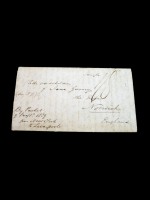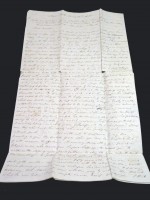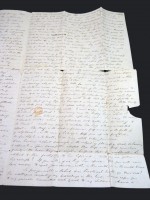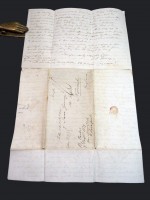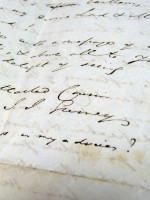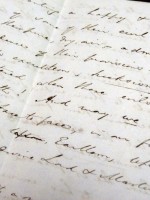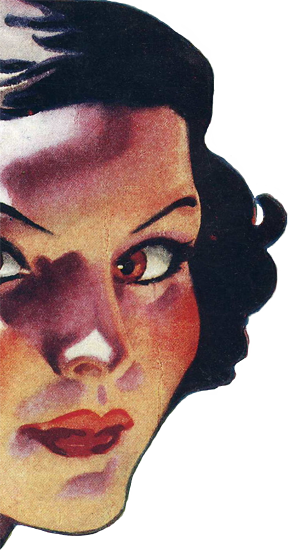Joseph John Gurney, a handwritten, signed letter to his family from New York, 1838
An important Quaker letter, referencing the schism in Quakerism, and his reforms in America
Author
Publisher
Printing Details
This is an important family letter sent from Joseph John Gurney to his cousins (addressed as the grandchildren of Jane Gurney) and sent by Gurney from New York during his controversial visit. The letter is addressed to the Backhouses, Birkbecks, Barclays & Peases—all members of the Gurney banking family who went on to found Barclays Bank.
The letter is four pages, written on one large sheet and folded to make its own envelope. Folded it measures approx 10 × 17.5cm, once opened each page measures 40 × 25cm.
Joseph John Gurney (1788–1847) was an English Quaker, banker and social reformer, brother of Elizabeth Fry. He became minister for the Society of Friends in 1818, and visited North America and the West Indies in 1837–1840, campaigning actively for emancipation for afro-americans, prison reform and the abolition of captial punishment. This letter is important as it firstly records, albeit briefly, his impressions of America: "America is a noble country – in various respects presenting a happy & hopeful aspect. I love the people & approve of some of their civil & political institutions – enjoy their fine, dry, air – admire their cloudless skies – grow fat upon the abundance of their provisions – but deeply mourn over these blots upon their executions, Hicksism & slavery." and secondly as it references the schism in Quakerism at that time, caused in some part by Gurney's visit. He was concerned that Friends had so thoroughly accepted the ideas of the inner light and of Christ as the Word of God that they no longer considered the actual text of the Bible and the New Testament Christ important enough. He also stressed the traditional Protestant belief that salvation is through faith in Christ.
The opening two pages are advice to his young cousins on leading the sober and faithful life, and with much reference to his grandfather (John Gurney, 1719–1779, Quaker and founder of the Gurney Bank in Norwich) and what a worthy and religious life he had lead.
This is the full text of the letter, where I've not been able to quite make out what what is written, I've added square brackets.
Addressed: To the Grandchildren of Jane Gurney, The Grove, Norwich, England.
By Packet [date] 1839, from New York to Liverpool
Letter:
New York, [date] 25th, 1838
To all the grandchildren of my beloved Aunt, Jane Gurney, down to all the babes who will in time, I hope, be able to read this letter. Backhouses, Birkbecks, Barclays & Peases.
Dear Hearts
I do not think it is in my power to tell you how heartily I love you & with what please I recollect the pleasant happy hours of easy friendship, which I have been accustomed to enjoy amongst the older ones amongst you. The letters which I have received from several of you since my lot has been cast in America have been acceptable and refreshing – go on writing to me – expecting no answers! Well my dear cousins – you know that this day has peculiar claims on your tender feelings – I [own] it is far from being uninteresting to me in its old fashioned character of Christmas – but we may all be allowed to shed a silent tear, when we recollect it is the anniversary of the death of your revered grandfather.
His image is, in a very lively manner, presented to my mind this afternoon. Truly he was a man of good liking of a handsome build both in body and mind – a right agreeable companion, fraught with amiable tempers, sound intellectual powers, playful good humour, & above all, deep, humble piety. He was, in that, no man's copy – a man of stirling integrity, & independence of mind who always thought for himself; & when any proposition or sentiment was [attend] by his companies, he was sure enough to examine the other side of the question; and be pricked at the weakness of many a plausible notion. He generally wore a smile. & knew how to laugh – his cheerfulness did credit to his religion & was the happy ornament of that settled seriousness which ever dwelt within. He had read considerably. & observed largely and acutely; so that his conversation seldom failed to be informing. His ministry was delivered on great brokenness [?]—it was lively, refreshing, original, frequently presenting some new train of thought for the instruction of his learners. I often think of the tenderness & love, which so peculiarly marked his demeanour, & shone upon his features, during the last few weeks of his mortal existence, Truly he was gathered – I reverently believe – as a shock of corn fully ripem ito the Lord's garner! Many were they who loved him dearly & honoured him faithfully & his memory will not perish.
You will not be displeased by my thus presenting to you the picture of one whom you have been taught to think of with reverence & affection. & no my dears all of you, permit a pilgrim cousin who craves your highest happiness, to beseech you to walk in the steps of your grandfather – to obey the same rule & mind the same thing – to follow him, as he followed Christ.
I am now fifty years old & have seen a good deal of the world – my acquaintance with the religious public & with serious fervours of various names and classes, has been extensive—& it is my testimony that I not seen a better way to walk in [there] that into which he was led – I mean simple, divine, living, quakerism. I think it is under no sectarian feelings, that I find myself penning that strange word quakerism. I have reference, chiefly to the well known news always entertained by the Society of Friends, respecting the supreme, immediate, & perceptible government of Jesus Christ, over his church, by the influence of his holy spirit. I wish you to understand in what sense I use the word “perceptible”. The distinct whispers of some private counsellor is perceptible to the ear – but no more so than the still small voice of the spirit of Christ in the heart, saying to every one of you, This is the way, walk ye in it. The light of the sun which reveals the objects of nature is perceptible to the eye; but not more so than the light of Christ which makes manifest moral truth to the consciences of all men & which shines on those particular duties, to which we are individually called as living members of the church of God. Thus with me the light has shone on a religious visitto America & on many a specific labour & service in that land. The gentle breeze which blows from the south, is perceptible to the feelings, but not more so than the general constraint of a divine influence which impels the Christian onward in his race of duty. When every wind ceases to blow, the very stillness is perceptible to the nerves of the body; but not more so than that holy tranquility of soul which the spirit imparts to the man of a good conscience—“the peace of God which passeth all understanding.”
Now my dearly beloved ones, abide and walk under this all effective government of a righteous saviour. Let every desire that would lead to transgression be checked – every rebel thought subdued – every undue conformity to the world & its vanities, surrendered—& be ye all that the Lord would have you to be. Imitate the example of Moses, & make all things according to the pattern showed to you in the moment, even to the least fair of the tabernacle. This is the true secret of Christian perfection – a standard hand to reach, but always to be followed. “Know ye not that your bodies are the temple of the Holy Ghost which is in you, which you have of God, & that your are not your own, but bought with a price.” O that costly, glorious price – the atoning blood of Jesus Christ, the one proprietorial offering for the sins of the whole world! Meditate in the infinite loving kindness of that Saviour who came down from the glory of his majesty to live & die for sinners, who bare your sins in his own body, on the [trees]; & lose not an hour – you dear older ones – in devoting yourselves, body & soul, to his service.
And now a few sentences on the word immediate. Friends hold the immediate influences of the Spirit in contrast with those who may allow the inspiration of the sacred writers, imagine that their writings are the only guide with which we are now favoured in the way of truth & righteousness. “the Scriptures”, say such persons, “were given forth by the Spirit of God – all therefore who believe & obey the scriptures are, through that medium, taught by the spirit.” We, on the other hand, assert that no man can savingly believe in the truths declared in the Scripture, or truly obey its precepts, unless his understanding is illuminated & his heart touched by the immediate, or direct influences of that Spirit who is himself the divine author of the book. Further than this, while we expect no revelation of the peculiar facts & doctrines of Christianity, except through scripture, we believe that the moral law is, to a certain extent, immediately revealed to all men, independently of the book; & also with respect to their individual callings in the church, Christians cannot ascertain them from Scripture. Here they have no other guide to look to, but the voice of the Spirit of Christ – who [?] sends to speak immediately with his people & to show them what are the services into which he is pleased to call them. May you, beloved ones, ever be attentive to his immediate teachings – they will guide you in the way of truth & righteousness, virtue & peace. From these remarks it is evident that there is nothing in the view taken by Friends of the immediate influences of the spirit (a view which is I believe increasingly offering [?] Christians of every name) which has the least tendency to discourage a diligent use of those means which God has appointed from an edification and growth in grace. Mind you do not neglect these means, as you value your immortal souls! Be fervent & instant in prayer – seek after refinement – reverently want upon God & [?] faith your hearts before him. He is a prayer learning & answering God. Never pass a day without reading a portion of scripture, in private—“meditate on these things”—give yourselves “wholly to them”. Be faithful and diligent in attending all meetings, both for worship & discipline – your pilgrim cousin charges you, in the name of his Master, never to subside into carelessness in these matters. Let him most specially advise youm, to be as regular as clock work in the attendance of your week-day meetings. I believe I could say with truth that the most profitable & happiest part of my life has been spent in these meetings – verily it is both good & pleasant to retire from the whirl & harm [?] of a money-getting, pleasure-hunting world to wait upon a glorious creator in the “silence of all flesh”. How many were the happy hours that I spent with your beloved grandfather after this sort – how many the calm and cheerful walks which we afterwards took together from the meeting to the Bank! Well my dears to conclude this long – and to me unexpected appeal—Be strong in the Lord – persevere, perseverance in the path of self-denial, in the race of holiness – give up all for Christ – be faithfull unto death, & no man shall take your crown. Bear however [?] postscript on the subject of plainness of speech, behaviour, & apparel – Your grandfather adopted these things under deep convictions of duty – He knew they were right – he found that they worked well and he adhered to them faithfully to his life's end – will you not follow his example? If you will, of one thing I am assured – that you will never have occasion to regret your decision, either in this world, or in the world to come.
So fare you well in the Lord & in his eternal truth, ye dear ones! For intelligence respecting my proceedings in this land, I must refer you to my journals transmitted week by week to my children. America is a noble country – in various respects presenting a happy & hopeful aspect. I love the people & approve of some of their civil & political institutions – enjoy their fine, dry, air – admire their cloudless skies – grow fat upon the abundance of their provisions – but deeply mourn over these blots upon their executions, Hicksism & slavery. May the day be hastened when these evils shall disappear from the face of the earth! And may we be permitted to talk over the whole affair, face to face, in our family circles at Darlington, The Grove, Keswick, Earlham, Upton, & Knot's Green – whenever it may please my divine Lord & Master, to permit my return to dear old England.
I must now conclude with a message of dear faithful & tender love to your parents & above all to your dear revered grandmother. May they have the delight of seeing you walking in the Truth –
I am your nearly attached cousin
J J Gurney.
I expect to find full use, this winter, for my noble fur coat – will you allow my dear children to be partakers of my desires? [?]
Condition
The letter is in good condition for age but with some wear. The sides that became the envelope are a little faded and tanned. The letter has been folded and there are some tears to the folds, these are most severe to the third and fourth pages. There is a small amount of marginal loss to the outer edge of the page three where the page envelope was closed with a seal, and torn slightly when opened. However, it remains readable, and as can be seen, I was able to transcribe it.
Further images are available on request. Also a version of the text of the letter which may be a little easier on the eye.
Sold
